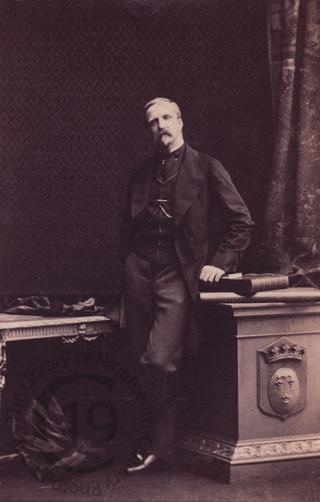
Henri d’Orléans, duc d’Aumale
A carte-de-visite portrait of Henri d’Orléans, duc d’Aumale (1822-1897).
Born on 16 January 1822, Henri Eugène Philippe Louis d’Orléans was the fifth and second youngest son of Louis-Philippe, King of the French and duc d’Orléans. He took the title duc d’Aumale.
While still young he inherited a large fortune from his godfather, the last Prince de Condé, Louis Henri II. Brought up with great simplicity, he entered the army with the rank of captain of infantry. He distinguished himself during the French invasion of Algeria and in 1847 he was promoted to the rank of Lieutenant-General and appointed Governor-General of Algeria, a post he held until the February of the following year. In this capacity he received the submission of the emir Abd el-Kadir in December 1847.
After the French Revolution of 1848 he, along with the other members of his family, retired to England, where he busied himself with historical and military studies. In 1861 he replied to Napoléon III’s violent attacks on the House of Orléans with a Letter upon the History of France..
At the outbreak of the Franco-Prussian War he volunteered for service in the French army, but his offer was declined. When he was elected deputy for the Oise département, he returned to France, and succeeded to the fauteuil of the comte Montalembert in the French Academy. In March 1872 he resumed his place in the army as general of a division, and in 1873 he presided over the court-martial that condemned Marshal Bazaine to death.
Having been appointed commander of the VII army corps at Besançon, he retired from political life, and in 1879 became inspector of the Army. However, the act of exception passed in 1883 deprived all members of families that had reigned in France of their military positions, and he was placed on the supernumerary list. In 1886 a further law was passed, barring all members of former reigning families from any public position, and expelling from French territory the heads of those families. The duc d’Aumale protested energetically but was nonetheless expelled. However, his will of 1884 bequeathed his Chantilly estate to the nation, with all the art collection he had collected there, to become a museum, and this generosity led the government to withdraw the decree of exile against him. He returned to France in 1889.
The duc d’Aumale died at Zucco in Sicily on 7 May 1897 and was buried in the Orléans chapel in Dreux.
Photographed by Camille Silvy of London on 5 March 1861.
Code: 124986




